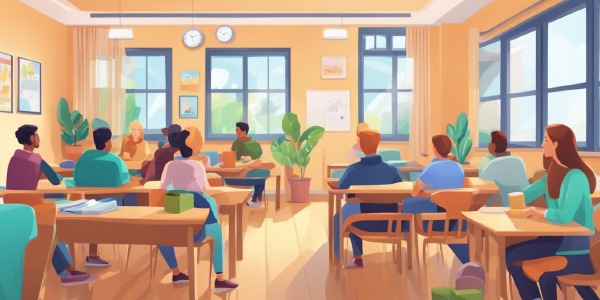Elder Education: Online Learning Resources for Senior Citizens - Embracing Technology at Any Age
In the age of digital transformation, online learning has emerged as a significant tool for senior citizens seeking to expand their knowledge, sharpen their skills, and stay mentally active.
With a multitude of resources available at the click of a button, the internet has made education accessible to elders from the comfort of their homes.
Engaging in online courses not only helps seniors to keep up with the fast-paced world but also plays a crucial role in maintaining cognitive function and mental health.

Elder education via online platforms is a growing field that offers a variety of courses and areas of study tailored to diverse interests and needs.
The benefits of continuous learning for seniors range from staying connected with global and local communities to enhancing physical health through intellectually stimulating activities.
For those navigating the post-retirement phase, educational pursuits can provide meaningful structure to their daily lives.
Key Takeaways
- Online learning provides seniors with easy access to education, helping maintain cognitive abilities.
- A wide array of courses enables seniors to remain mentally and socially engaged.
- Pursuing education online can contribute to a fulfilling and structured post-retirement life.
Understanding the Basics of Online Learning

For many seniors, online education offers a flexible and convenient way to continue learning. It requires a basic understanding of technology and the right tools to get started.
Introduction to Online Education for Seniors
Online education opens up new opportunities for you to engage with material at your own pace.
As a senior, you have access to a wide array of educational resources, from university lectures to skill-specific workshops.
These resources cater to different interests and educational goals, making it possible for you to explore new subjects or deepen your knowledge in a familiar area.
An introductory course can help you navigate the digital landscape of senior education and build confidence as you move forward.
Advantages:
- Flexibility in scheduling
- Diverse course offerings
- Comfort of learning from home
Common Platforms:
- MOOCs (Massive Open Online Courses)
- Educational websites
- Community college online portals
Types of Courses:
- Academic subjects
- Practical skills
- Hobby-related learning
Technological Know-How and Tools for Elder Students
To participate in online learning, you’ll need to familiarize yourself with basic technology needed for online education.
The essential tools include a reliable computer or tablet, a strong internet connection, and sometimes peripheral devices like a printer or webcam.
Depending on the course, specific software may be necessary—often made clear in the course requirements.
Basic Skills:
- Navigating web browsers
- Using email and communication platforms
- Managing files and folders
Helpful Resources:
- Tech tutorials
- Local library workshops
- Senior community centers
By embracing these technologies and resources, you can take a proactive step towards enhancing your education and staying connected in the digital age.
Exploring Online Learning Platforms

Online learning opens up a world of knowledge and skill-building opportunities for senior citizens. Let’s navigate the landscape of virtual education, focusing on popular course providers and supportive age-friendly communities.
Popular Online Course Providers
- Coursera: Partnering with top-notch universities, Coursera offers a vast array of subjects. You’ll find courses from institutions like Stanford and Yale. Each class can be taken at your own pace, with some offering certificates upon completion.
- Udemy: Great for lifelong learners, Udemy provides a broad selection of courses. Whether you’re interested in art, technology, or health, there’s something for your curiosity and skill level, with new courses added regularly.
YouTube serves as an informal learning hub. Many universities and community colleges post lectures and tutorials for free, making it accessible for you to learn a new hobby or subject.
Finding Age-Friendly Learning Communities
- Senior Planet: This is tailored for learners over sixty, combining technology training with online courses. Senior Planet delivers an engaging community experience while helping you stay tech-savvy.
- Local Libraries: Often, they offer free workshops and classes to cardholders. Check your library’s website or call to inquire about their partnerships with online learning platforms and available resources.
Many community colleges also provide specific programs designed for seniors, allowing you to learn alongside peers in an understanding and welcoming environment.
Courses and Areas of Study

When you step into the realm of online education, you’ll find a vast array of courses and study areas tailored for older adults keen on expanding their skills and knowledge.
Whether your interest lies in pursuing formal education or indulging in various subjects for the joy of learning, opportunities abound.
Pursuing College Degrees and Certificate Programs
If you’re eager to earn a college degree or a certificate, many universities now cater to older adults with programs that are flexible and accessible.
You can pursue an Associate’s, Bachelor’s, or even a Master’s degree online from reputable institutions. Here’s what you need to know:
- Degree types: Universities offer a range of options such as Associate of Arts (AA), Bachelor of Science (BS), or Master of Arts (MA).
- Program flexibility: Courses are designed to fit your schedule, often allowing you to learn at your own pace.
- Certification: Short-term certificate programs in fields like healthcare, education, or business offer a quick way to gain relevant skills.
Choosing to advance your education can lead to personal growth and, potentially, new career opportunities.
Lifelong Learning Opportunities in Various Subjects
Lifelong learning is about the joy of gaining new knowledge without the pressure of exams and assignments.
Explore a rich tapestry of subjects that interest you:
- Arts and Humanities: Dive into history, literature, philosophy, or fine arts courses tailored for learners at all stages.
- Science and Technology: Keep abreast of the latest in computers, internet safety, or even space science.
- Practical Skills: Engage in courses on personal finance, health, and wellness, or even home gardening.
Remember, the aim is enrichment and personal satisfaction. Your journey in lifelong learning can be as diverse as your interests, and you can often find courses offered for free or at a nominal cost.
The Importance of Staying Connected

In the age of technology, your ability to stay connected with community and loved ones is enhanced by online learning resources.
Using Online Education to Maintain Social Engagement
Online courses offer you more than just knowledge; they provide a platform to engage with peers who share your interests.
Through forums and virtual classrooms, you can:
- Participate in group discussions.
- Take part in live, interactive webinars.
- Join online clubs or study groups related to the course subject.
This level of social engagement can foster a sense of community, keeping you integrated in social circles and preventing feelings of isolation.
Connecting with Family and Friends Through Learning
With online learning, you have the unique opportunity to connect with family and friends through shared educational experiences. Here are ways to integrate learning and bonding:
- Enroll in courses together: Choose topics of mutual interest and discuss them during family gatherings.
- Create a learning group: Support each other’s progress and keep motivated.
Overcoming Barriers to Online Education

Online learning can be particularly challenging for seniors who might not have the same level of tech-savviness or experience in formal education settings as their younger counterparts.
To successfully navigate the digital landscape, you’ll need to address specific barriers that could impede your progress.
Addressing Technological Challenges for Seniors
Identify the Right Tools:
- Start by getting familiar with the basic devices, such as a desktop computer, laptop, tablet, or smartphone.
- Ensure your internet connection is stable to avoid disruptions during learning sessions.
Building Digital Skills:
- Set aside time for tutorials that enhance your tech skills, such as navigating websites and using learning platforms.
- Local libraries often provide free classes to help you become more tech-savvy.
Tackling Learning Barriers for Older Adults
Creating a Conducive Learning Environment:
- Arrange a quiet, well-lit space where you can attend online classes without interruptions.
- Invest in comfortable seating and proper ergonomics to maintain focus and comfort during long study periods.
Tailored Learning Approaches:
- Seek out courses designed with senior learning in mind, potentially featuring slower paces and repetitive content for mastery.
- Take advantage of resources that play to your strengths, such as visual aids or audio recordings to supplement reading materials.
Enhancing Mental and Physical Health

Utilizing online learning resources can play a significant role in maintaining your cognitive function and physical health. These resources offer a wide range of courses tailored to improve mental sharpness and encourage a lifestyle that supports overall wellness.
Cognitive Health and Online Learning
Online learning platforms offer various courses designed to keep your mind active. Engaging in these educational activities can:
- Strengthen your cognitive abilities, potentially slowing the progression of age-related memory decline.
- Enhance mental health, as learning new skills can contribute to a sense of accomplishment and purpose.
Some platforms to consider include:
- Coursera: Offers courses in partnership with top universities on subjects like psychology, which can help understand and maintain mental health.
- SeniorLearn: Focused on senior learning, it provides book discussions and memory-boosting workshops.
Fitness and Nutrition Courses for Senior Well-Being
Physical activity, paired with proper nutrition, is vital for maintaining your health and wellness. Online courses can guide you on how to:
- Incorporate fitness into your daily routine safely.
- Understand nutritional needs for seniors to support physical health and cognitive function.
| Resource | Type | Focus Area |
|---|---|---|
| SilverSneakers | Fitness programs | Custom exercise routines for seniors |
| Nutrition for Health Promotion and Disease Prevention | Nutrition course on Coursera | Teaches about dietary needs for older adults |
Remember, checking with your healthcare provider before starting any new fitness or nutrition program is crucial to ensure it’s right for you.
Cultural and Entertainment Activities for Seniors

Engaging in cultural and entertainment activities can enhance your life, offering both enjoyment and educational experiences.
Music, Art, and History Through Online Resources
You can explore a wide range of music, art, and history resources online, each designed to cater to your interests and curiosity. Notable platforms include:
Coursera and Khan Academy:
- Offers comprehensive courses spanning from classical music appreciation to modern art and world history.
- Interactive and user-friendly, allowing you to learn at your own pace.
Google Arts & Culture:
- An extensive digital platform providing virtual tours of museums and galleries.
- Engage with thousands of artifacts and artworks up close.
YouTube Channels:
- Channels such as “The Great Courses Plus” and “TED-Ed” create content specifically about historical events and cultural insights.
- Easy to navigate, with playlists organized by topics for your convenience.
Cooking Classes and Entertainment Media
Expand your culinary skills and indulge in diverse entertainment media online:
Cooking Classes:
- Websites like MasterClass and BBC Food offer classes led by renowned chefs where you can learn to cook different cuisines.
- Access recipes and step-by-step instructional videos that guide you through the cooking process.
Entertainment Media:
- Stream classic films, documentaries, and television shows on platforms like Netflix, Hulu, or Amazon Prime Video.
- Join book clubs or literary discussions through apps like Goodreads to engage with fellow readers.
Combining culinary exploration with the vast array of music, art, history, and other media creates a fulfilling and intellectually stimulating environment that caters to your interests and allows for personal growth.
Support Structures and Resources

Senior education benefits greatly from a range of support structures and resources designed to meet your learning needs and preferences. Community resources and supportive technology play key roles in providing you accessible and practical options for online learning.
Community Resources for Senior Education
Your local community colleges and universities often extend learning opportunities to senior citizens. These can include:
- Non-credit courses: Tailored for personal enrichment, these courses can range from art history to modern technology.
- Special programs: Designed with your pace in mind, these often involve group settings and emphasize peer interaction.
Libraries are also invaluable as they frequently offer:
- Free workshops and classes.
- Access to computers and internet.
- Guidance on finding reliable online educational resources.
Supportive Technology and Apps for Elder Learners
To enhance your online educational experience, there is a variety of apps and technology available that cater to elder learners:
| Apps | Use |
|---|---|
| Duolingo | Learn new languages at your own pace. |
| Peak | Brain games to challenge and entertain. |
| Audible | Access a vast library of audiobooks. |
| Zoom | Attend virtual classes and interact with peers and instructors. |
- Reading Assistants: Tools like Amazon’s Kindle offer text size adjustments to make reading more comfortable for you.
- Teaching Aids: For those interested in gaining new skills, YouTube hosts countless tutorials from cooking to coding.
Life After Retirement

Retirement marks a significant transition that brings ample time for personal development and social engagement. Your journey as a lifelong learner doesn’t pause; it transforms.
Embracing Lifelong Learning Post-Retirement
As a retiree, the pursuit of knowledge and new skills can be incredibly fulfilling. There’s a wealth of online learning resources tailored to suit your pace and preferences. For instance:
- Coursera and Udemy: These platforms offer courses on a multitude of subjects, often with senior discounts.
- YouTube: It’s a goldmine for free tutorials and lectures, from gardening to tech skills.
You can also find learning opportunities specifically curated for seniors:
- GetSetUp: This online community offers live classes taught by retirees, for retirees, covering topics relevant to your daily life.
Learning not only keeps your mind sharp but can also introduce you to new hobbies and interests during retirement.
Engaging with Local and Online Communities in Retirement
Retirement is an excellent time to expand your social circles and stay connected. Here are ways you can engage:
- Meetup: Whether it’s a book club or walking group, you can find local gatherings or online events that pique your interest.
- Facebook Groups: This platform hosts various communities; you can join groups focused on aging gracefully or sharing retirement tips.
Local community centers often host events for seniors:
- Community Center Activities:
- Bridge or chess clubs
- Exercise and wellness classes
- Art and cultural activities




